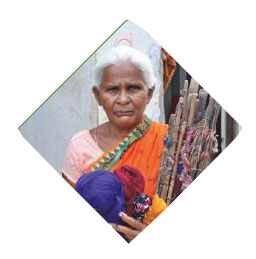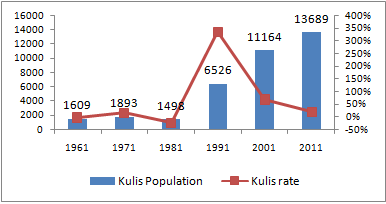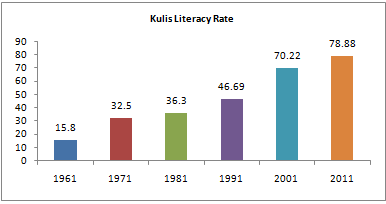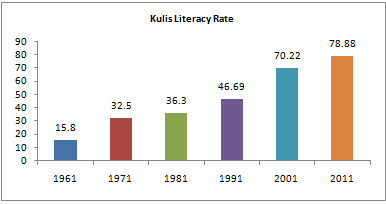A scheduled tribe of Odisha.

Location (Major) : Bargarh, Bolangir, Sambalpur
Language : Odia (Indo-Aryan)
Major Occupation : Weaving, Cultivation, Wage-earning
Other Distinct Socio-cultural Features
The Kulis are numerically a small community in Odisha. The name ‘Kuli’ might derive from the word ‘Kula’, the dumb-bell of the cow used in carding or from the word ‘Kulina’ meaning clean work, denoting their traditional occupation of weaving. Like the Koli the Kuli are weavers by occupation though in the past it was claimed by many that their main occupation was the carding of cotton. The tribe is endogamous and are divided into various exogamous totemistic septs (Gotras) i.e. Bagho (Tiger), Nago (Cobra), (Kakar) Basur (Kakar), Neial (Neula) and Mohanto. Monogamy is common rule in their society. Kulis family is nuclear, patrilocal and patrilineal. Inheritance of paternal property follows the rule of primogeniture in male line only. They observe puberty rites (Rajathala) for pubescent girls attaining their first menarche. Marriage through negotiation is the ideal form of marriage. The other mode of acquiring mate is through mutual consent. Junior levirate, sororate and cross cousin marriage, remarriage of widows, widowers and divorcees are permitted by their society. They practise burial and cremation to dispose of their dead and the death pollution continues for eleven days. They have their own traditional community council headed by Gountia and assisted by Dakua, their messenger and the posts of these office bearers are hereditary in nature. They profess Hinduism, observe Hindu festivals and worship Hindu gods and goddesses. Their chief deity is Biswakarma and their main festivals are Dewali and Dasahara. They do not suffer from the stigma of untouchability. The Brahmans serve them at the marriage ceremony, mortuary rites and other functions. The washerman washes their clothes which include those worn by women at menstruation. The barber serves them by cutting their hair and shaving their beards. The Gouda (milkman) accepts water from the Kulis and mixes with them freely. The Kultas, a cultivating caste equivalent in status to the Khandayats, accept water from the Kulis. . It is quite evident that the Kuli have become fully integrated into the hierarchy of Hindu society.


